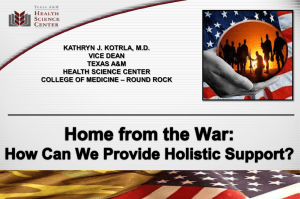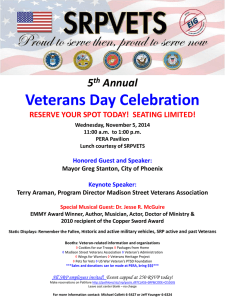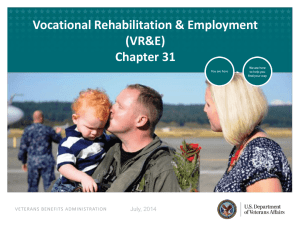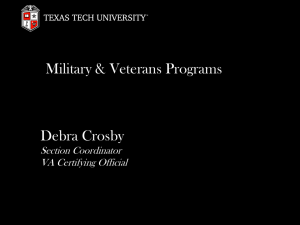Encounters With Returning War Veterans - NAMI-NC
advertisement
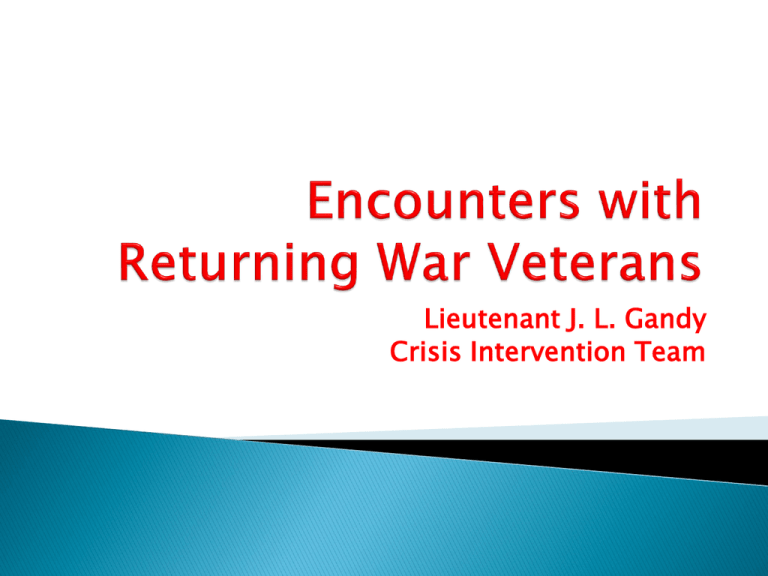
Lieutenant J. L. Gandy Crisis Intervention Team Approximately 1.64 million troops have been deployed in support of operations in Afghanistan and Iraq. Just over half of those have been national guard and reservists. 500,000+ have separated from the military & 138,000+ have come into the VA system. From 1999-2004, 72,000 veterans have been diagnosed with PTSD. About one-third of returning service-members report symptoms of a mental health or cognitive condition. Roughly half of those who need treatment for these conditions actually seek it. May be prescribed medication that has too many side effects Could harm career Could be denied security clearances May appear weak to co-workers if they found out Fellow veterans, friends, and family would be more helpful Does this sound familiar (like police officers)? Rand Corporation 2008 Depression Post Traumatic Stress Disorder (PTSD) Traumatic Brain Injuries (TBI) Drug and/or alcohol abuse Thought to be the most common diagnosis in returning veterans Results in sleep problems: Insomnia and Hypersomnia Decreased interest in pleasurable activities Sometimes accompanied by “survivors guilt” Loss of energy or fatigue Diminished ability to concentrate or think, indecisiveness Loss of appetite or increased appetite resulting in weight loss or gain Having thoughts, plans, or previous attempts of suicide - may be aggravated by availability of firearms. This occurs when a person is exposed to a traumatic event. The person had experienced, witnessed, or was confronted by an event that involved actual or threatened death or serious injury, or a threat to the physical integrity of self or others. It is a natural response to intense fear, helplessness, or horror. Re-experience of the event: intrusive recollections, distressing dreams, flashbacks, intense distress at exposure to similar events and physical reactions to exposure. Increased arousal symptoms such as sleep problems, irritability, concentration problems, hyper-vigilance, exaggerated startle response. Avoidance symptoms such as avoiding thoughts, feelings, activities, places, or people that bring back memories, includes decreased interest in activities - often keeping to themselves. This injury is caused when something strikes a persons’ head very hard or an object actually penetrates the skull and enters the brain. Blast/shockwaves, alone, from Improvised Explosive devices (IED) or other explosive devices can cause TBI. Constant Headaches Confusion, apathy, anxiety Light headedness or dizziness Changes in mood and/or behavior Sleep disorders Trouble with memory or concentration Repeated nausea or vomiting Problems with vision and hearing Seizures Extreme anger or violent behavior Serious thoughts of hurting oneself or others Decreased interest in pleasurable activities Frequent nightmares and intrusive thoughts After being exposed to combat stress, it is difficult for some veterans to: Relax Cope with Emotions Get Restful Sleep Be a good listener Feel emotionally connected to family and friends Stay focused due to intrusive thoughts Intrusive thoughts are unwelcome, involuntary thoughts, images or unpleasant ideas that may become obsessions, are upsetting or distressing, and can be difficult to be free of and manage. Intrusive thoughts may include improper urges or images that fall into three categories: Inappropriate aggressive thoughts, inappropriate sexual thoughts, or blasphemous religious thoughts Sometimes it is difficult to separate reality from perception. The overwhelming majority of veterans, to include those experiencing some lasting condition from their war experiences will never have a serious contact with police. However, the most frequent acts that may bring some veterans in contact with police may include the following: Domestic Disputes or complaints of family abuse – due to stress within the household/failure to adjust to being home. Disputes with others Traffic stops as a result of aggressive/reckless driving: Some veterans who drove in convoys may find themselves inadvertently speeding, down the middle of the road, and failing to stop at stop signs and traffic signals. Suicidal or other types of mental health crisis: i. e: barricaded subject War veterans are familiar with common police tactics: Control techniques, hand to hand combat, weapons retention, closing the gap and moving and shooting They have an increased perception of threats – hyper-vigilance (the same as police officers) They are constantly looking for something wrong or out of place that may be a threat to them or those around them Respond supportively if the person appears upset during a police procedure Speak in a calm, matter of fact voice Reassure the person that everything is okay and that they are safe Explain any police procedures you may have to make, prior to making them and make sure the person understands what you are about to do. Remind the person of his or her current location and situation. Always show respect and explain what you are doing. Thank the veteran for his or her service Offer assistance to veterans through organizations set up to do so Veterans Administration hospitals Portsmouth Naval Hospital Psychiatric Center Web Resources Military Onesource: http://militaryonesource.com 1-800342-9647 Operation Healthy Reunions: http://www.mentalhealthamerica.net/reunions/index.cfm Vet Centers: Confidential readjustment counseling for combat veterans and their families – 1-800-905-4675: http://vetcenter.va.gov/ Rand Corporation: 1-877-584-8642: http://veterans.rand.org Nothing in this lesson plan is meant to demean or to stigmatize returning war veterans. Our veterans deserve our gratitude, respect, understanding, and patience. In order to assist those veterans, officers must be aware of the symptoms of depression, PTSD, and TBI and be able to communicate in a respectful and understanding way in order to provide assistance to those in need. Officers should be aware of resources available to assist and support those returning veterans having difficulty with re-adjusting to postdeployment home life. RAND Corporation publication: Post Deployment Stress: What you Should Know, What you Can Do RAND Corporation Study: Invisible Wounds Brief (Rand Center for Military Health Policy Research) Mixing CIT & The Military, a presentation by Sgt. Corey Nooner, Oklahoma City Police Department (corey.nooner@okc.gov)


